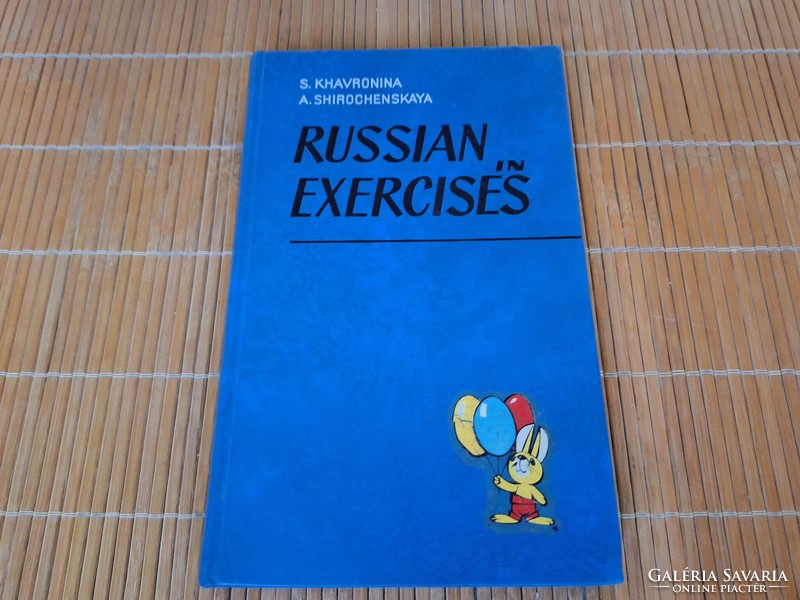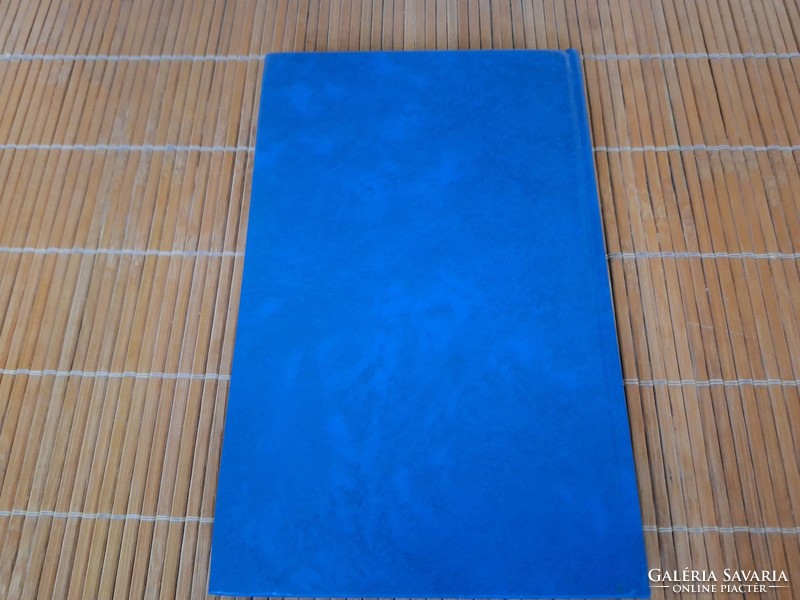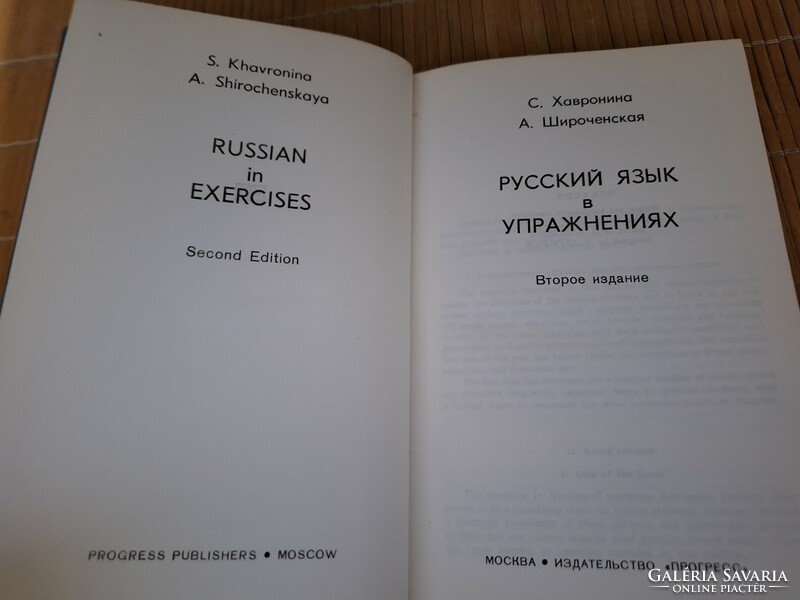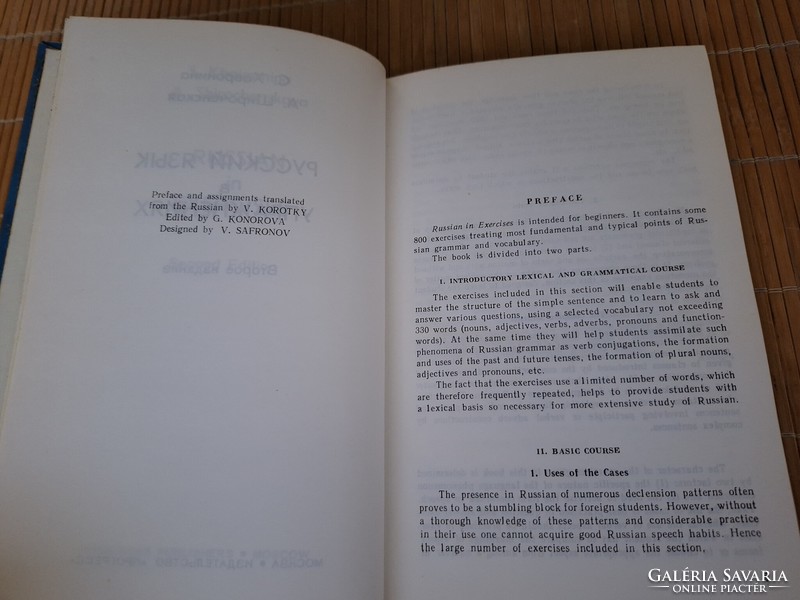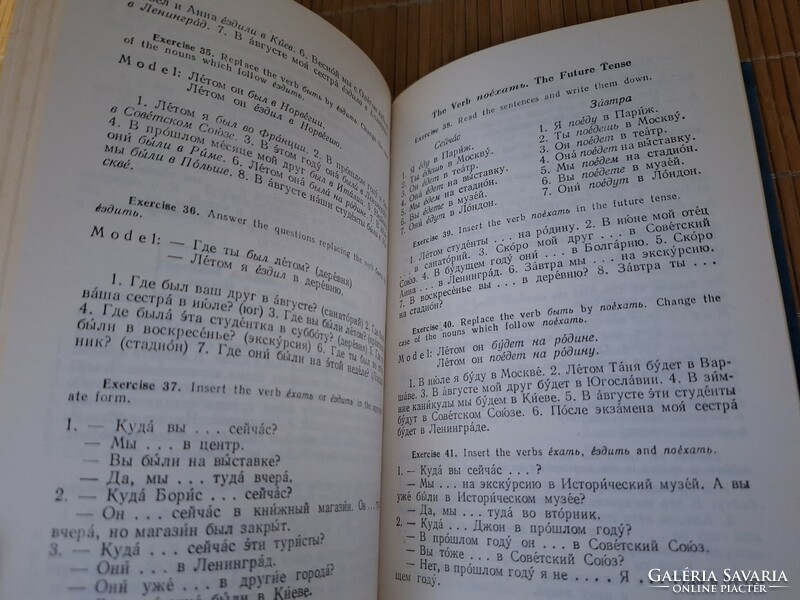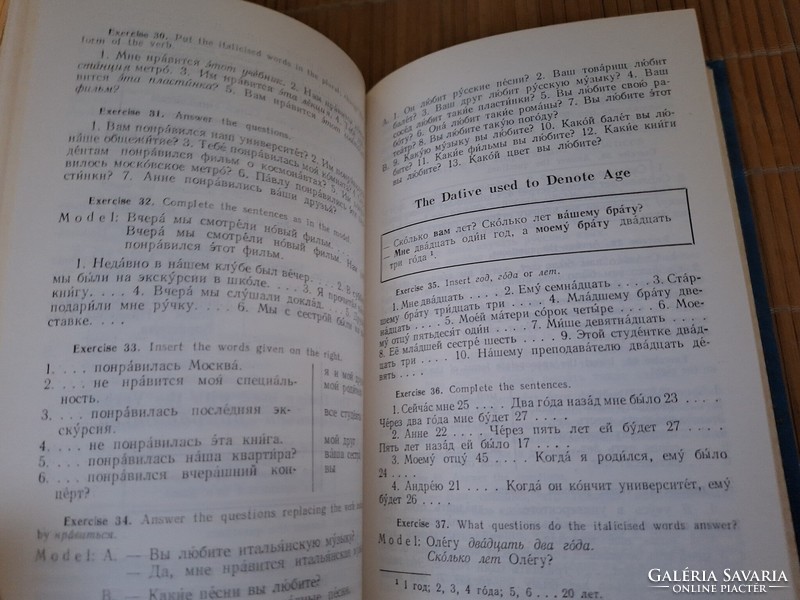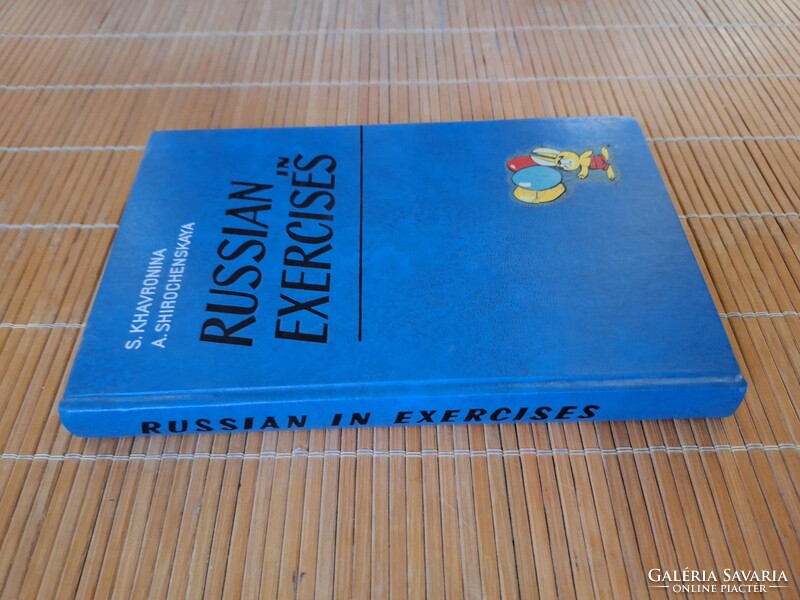S. Khavronina:Russian in Exercises. OROSZ GYAKORLATOK. 4500.-Ft.
| Feltöltés ideje: 2024. március 06. |
| Termékkód: 4426054 |
| Megtekintések: 32 |
| Megfigyelők: 0 |
| Ajánlatok: 0 ajánlat |
sharky1 (990)
![]() Heves megye
Heves megye
Hitelesített felhasználó
Tudja meg, milyen lépésekkel tesszük biztonságosabbá és kényelmesebbé online piacterünk használatát. Részletek
| Nyelv: | angol |
| Állapot: | jó |
| Kötés típusa: | kemény kötés |
S. Khavronina:Russian in Exercises
OROSZ GYAKORLATOK.
SZERZŐ:S. Khavronina,A. Shirochenskaya
Kiadó:Progress Publishers
Kiadás helye:Moszkva
Kötés típusa:Fűzött kemény papírkötés
Oldalszám:349 oldal
Nyelv:Angol Orosz
Méret:21 cm x 13 cm
ISBN:Megjegyzés:Fekete-fehér illusztrációkkal.
TARTALOM
Introductory Lexical and Grammatical CourseThe Noun. The Singular. The Questions Sto étá? Kto étá?15The Verb. The Present Tense19The Question Kak?22The Question Kágdá?25The Question Sto gyélájet?27Revision Exercises30The Gender of Nouns31The Possessive Pronouns moj, tvoj, nás and vás31The Verb. The Past Tense33The Verb. The Future Tense37The Plural of Nouns39Possessive Pronouns. The Question Csej?42The Construction U minyá, u tyibjá jeszt...44The Demonstrative Pronouns étát, éta, éto, étyi. The Questions Kákój? Kákájá? Kákóje? Kákíje?47The Adjective49Adjectives with the Stem ending in a Hard Consonant49Adjectives with the Stem ending in a Soft Consonant50Adjectives with the Stem ending in g, k, h51Adjectives and Adverbs. The Questions Kájój? and Kák?54Use of the Verbs hátyéty, ljubíty, mocs and the Word bólzsen with the Infinitive55Basic CourseUses of the CasesThe Prepositional CaseThe Prepositional used to Denote Place59Singular Nouns in the Prepositional59The Prepositional used to Denote the Object of Speech of Thought66Personal Pronouns in the Prepositional67Singular Adjectives in the Prepositional68Possessive Pronouns in the Prepositional72The Pronoun szvoj in the Prepositional73Plural Nouns and Adjecitves in the Prepositional75The Prepositional used to Denote TIme77The Prepositional used in Other Meanings79The Accusative CaseThe Accusative used to Denote the Object of an Action81Singular Nouns in the Accusative81Singular Adjectives and Pronouns in the Accusative84Personal Pronouns in the Accusative89Plural Nouns in the Accusative91Plural Adjectives and Pronouns in the Accusative93The Accusative of Direction94Use of the Accusative with the Verbs klaszty - polozsíty, sztávity - pásztávity and vésaty - pavészity101The Accusative used to Denote Time103The Dative CaseThe Dative used to Denote the Person toward Whom an Action is Directed106Singular Nouns in the Dative106Plural Nouns in the Dative109Personal Pronouns in the Dative111Adjectives and Possessive Pronouns in the Dative114The Dative used with the Verbs irávisztyá - pánrávisztyá117The Dative used to Denote Age119The Dative in Impersonal Sentences121Use of the Dative with Prepositions123The Genitive CaseSingular Nouns in the Genitive129Use of the Genitive after the Negative Words nyem, nye bűlo, nye búgyet129Singular Adjectives and Pronouns in the Genitive131Use of the Genitive with the Numerals dva, tri and csetűre134Plural Nouns in the Genitive136Use of the Genitive with mnógá, málo, szkólká, nyészkólká, nyemnógá and the Numerals pjáty, seszty, szem, etc.136Plural Adjectives and Pronouns in the Genitive141The Genitive used to Denote Possession143The Adnominal Genitive145The Genitive used with the Comparative Degree147The Genitive used to Denote the Date148Use of the Genitive with Prepositions149The Instrumental CaseSingular Nouns in the Instrumental158The Sociative Instrumental158Singular Adjectives and Pronouns in the Instrumental160Personal Pronouns in the Instrumental163Plural Nouns, Adjectives and Possessive Pronouns in the Instrumental164The Instrumental used as the Nominal Predicative166The Instrumental after the Verb zanyimátyszjá, intyereszovátszjá, etc.169The Instrumental used to Denote Place170The Instrumental in Passive Constructions171The Instrumental used in its Proper Meaning172The Instrumental used in Other Meanings172Revision Exercises in the Uses of the Cases174The VerbVerbs of MotionUnprefixed Verbs of Motion and the Verbs pájtyí and pajéháty178The Verb idtyí. The Present Tense178The Verb hágyity. The Past Tense179The Verb pájtyí. The Future Tense182The Verb jéháty. The Present Tense185The Verb jézgyity. The Past Tense186The Verb pájéháty. The Future Tense189The Verb idtyí - hátyity191The Verb jéháty - jézgyity193Prefixed Verbs of Motion198The Prefix pa-198The Prefixes pri- and u-200The Prefixes v- (va-) and vü-206The Prefixes pad- (pado-) and at- (ato-)207The Prefix da-208The Prefixes pro- and pere-208Revision Exercises209Verbs with the Particle -szja219The Verbs ucsíty and ucsítyszja214Verbs with the Passive Meaning215Verbs with the Middle-Reflexive Meaning217Verbs with the Meaning of Reciprocal Action223Verbs with the Proper Reflexive Meaning225Revision Exercises225The Aspects of the Verb228Use of Imperative Verbs to Denote Repeated Actions234Use of Perfective Verbs to Denote Momentary Actions234The Imperfective Aspect after the Verbs nacsináty, prádálzsáty, and káncsáty237Use of Imperfective and Perfective Verbs in the Future Tense238Use of Aspect Pairs of Certain Verbs241Use of the Verbs vígyety - uvígyety, znaty - uznaty and szlűsaty - uszlűsaty243Use of Perfective Verbs with the Prefixes pa- and za-244Revision of Exercises245The Complex SentencesClauses introduced by the Conjunctive Words kto, sto, kakój, kak, gtye, kudá, átkudá, pácsemú, zacsém and szkólká254Clauses introduced by the Conjunctions patamú sto and páétamu255Clauses introduced by the Conjunction jészli257Clauses introduced by the Conjunction stóbü259Clauses introduced by the Conjunction hatyá261The Pronouns tot, to used as Correlated Words262Clauses introduced by the Conjunctive Word kátórüj264Direct and Indirect SpeechI. The Direct Speech is a Statement271II. The Direct Speech is a Question containing and Interrogative Word272III. The Direct Speech is a Question containing No Interrogative Word272IV. The Direct Speech is an Order or Request273Revision Exercises274Sentences containing Participle and Verbal Adverb Constructions276Participles276Present and Past Participle Active276Complete Form Participles Passive284Short Form Participles Passive291Complete and Short Form Participles Passive293Verbal Adverbs295Imperfective Verbal Adverbs295Perfective Verbal Adverbs297Key to Exercises304
Fizetési opciók
| Banki előre utalás |
| Készpénz |
Szállítási opciók
| Szállítás innen: Magyarország Feldolgozási idő: 1-2 munkanap A feldolgozási idő megmutatja, hogy az eladónak a fizetéstől számítva mennyi időre van szüksége a tárgy becsomagolásához és feladásához. Ez alapján tájékozódhat a vevő, hogy a fizetést követően mikor várhatja a csomag feladását. | |
| Személyes átvétel | Eger |
| Foxpost - csomagautomata | 1639 HUF |
| Foxpost - házhozszállítás | 2459 HUF |
| MPL - csomagautomata | 1195 HUF |
| MPL - házhozszállítás | 2060 HUF |
